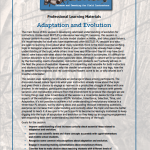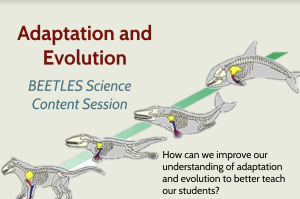The main focus of this session is developing adult-level understanding of evolution for instructors. Unlike most BEETLES professional learning (PL) sessions, this session is science content–focused, doesn’t include model student activities, and takes place indoors. It’s recommended for staff who have experienced other BEETLES PL sessions and who are open to learning more about what many scientists think is the most essential unifying topic in biological science: evolution. Some of your instructors may already have a deep understanding of the topic, while others may have very little—and they all may have (and teach) some inaccurate ideas about the topic. Since evolution is so complex, it’s difficult for science educators to not share some inaccurate ideas. Although in nature we’re surrounded by the fascinating results of evolution, instructors and students can’t actually witness in the field the process of evolution. However, it’s interesting and valuable for both instructors and students to try to figure out why the slender salamander has such tiny legs, how the fit between hummingbirds and red cone-shaped flowers came to be, or why whales don’t breathe underwater.
This session uses readings to stimulate an exchange of ideas among participants. The discussion-based nature taps into what your instructors already know about the topic and gives them a chance to engage as learners in a productive struggle of ideas with one another. In the session, participants explore how natural selection interacts with genetic variation and reproductive pressure from the environment to produce the changes we see in living things over time. A backbone of the session is a mnemonic device for the critical aspects of the evolutionary process—VISTA: Variation, Inheritance, Selection, Time, and Adaptation. It’s not possible to achieve a full understanding of evolutionary science in a three-hour PL session, but by sharing ideas and puzzling through interesting questions, everyone can increase their understanding and curiosity about the topic and become better prepared to teach it. A key goal is for participants to become increasingly motivated to keep digging into the topic of adaptation and evolution so they keep up an ongoing engagement with expanding both their understanding and their teaching of the topic.
Goals for this session are:
- Improve understanding of and increase curiosity about essential ideas related to adaptation and evolution.
- Learn to use scientific terms and share concepts accurately with upper-elementary and middle school students.
- Recognize some common misconceptions about adaptation and evolution.
- Engage in meaning-making conversations about evolutionary theory.
- Consider how to make choices about teaching students with different levels of
understanding and experience with the topic.


